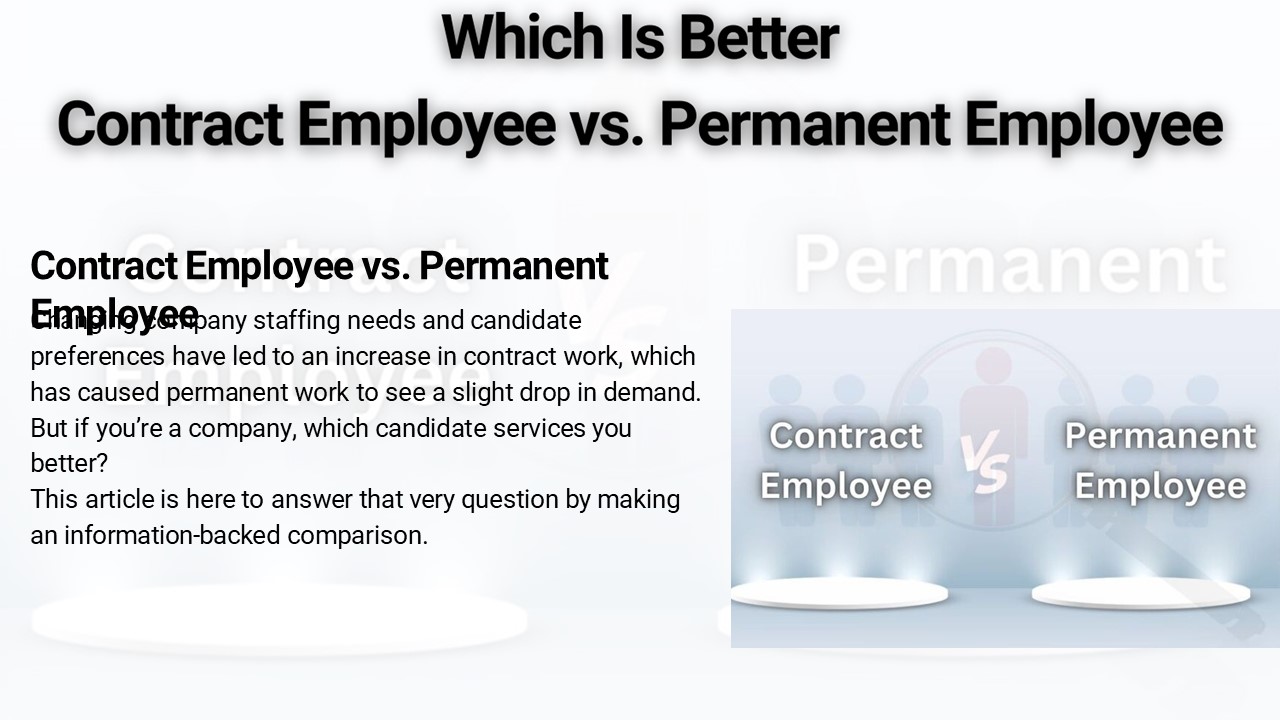Contract Employee vs. Permanent Employee: Which Is Better PowerPoint PPT Presentation
Title: Contract Employee vs. Permanent Employee: Which Is Better
1
Contract Employee vs. Permanent Employee
Changing company staffing needs and candidate
preferences have led to an increase in contract
work, which has caused permanent work to see a
slight drop in demand. But if youre a company,
which candidate services you better? This
article is here to answer that very question by
making an information-backed comparison.
2
What Are Contract Staff?
Anything contractual means a defined time.
Contractual work means staff only work for a
company for a limited time. This contract can be
until completion of a project and their skills
are no longer necessary.
If, by chance, the skills are still necessary
after the contract ends, a renewal is possible.
The core benefit of this short-term work
association is Temporary staff get to use their
skills, contribute, and work for various clients
while having flexibility. Companies get
specialised skills, knowledge, and an outsiders
view. Various top job portals now cater to this
type of work, and it has become easier to close a
short-term position. What Are Permanent
Staff? The key word here is permanent, meaning
persisting or long-term work agreements. These
staff are carefully tested and added to a
companys workforce to add lasting value. They
remain with the company until either party
decides to end their employment. Until then, the
company can invest in employees and vice versa.
3
Differences Between Contract and Permanent
Employees
- Definitions aside, here is how you can
distinguish between contract and permanent
employees. - Employment Type
- Distinguishing the employment type is vital as it
affects tax and benefits. - Contract staff are hired for their skills, which
means their employment is contractual or
temporary. This employment type is by no means
long-term and doesnt offer candidates the
complete package. - Permanent staff are persisting members of a
companys workforce and benefit from a
long-lasting employment type. This guarantees
the company and employees a partnership until one
party decides against it. - Salary Benefits
- Contract-based workers receive hourly or weekly
pay that aligns with their skill level or
experience. - Fixed pay is in place for permanent workers on
the companys payroll system. They get a yearly
increment based on their performance throughout
the year.
4
3. Work Security
Stability gives employees security and companies
the ability to scale and improve
operations. Temporary staff enjoy work
flexibility and multiple opportunities in a short
time. Unfortunately, it comes at the cost of
stability, as their contract can come to an
unexpected end. When struggling to get contracts,
they can face a time of uncertainty that affects
them mentally and financially. Persisting staff
benefit from stability and can make plans based
on this security. They are protected by labour
laws and have defined job descriptions and work
terms. Overall, they can be in a better mental
state and are more motivated to work because
they feel valued. 4. Role Responsibilities The
roles and responsibilities of staff can vary
based on their skills, employment type, and
position. Short-term staff fill a skill gap that
stops companies from completing projects. These
individuals operate in a specific industry and
an even finer niche. They must deliver the
requirements within a time frame and
can. Long-term employees have desirable skills
and knowledge and can improve throughout their
tenure. They work with other co-workers in other
departments to complete tasks.
5
5. Growth Career Advancement
Contract workers are brought on board for their
skills and knowledge in a specialised field. So,
its unlikely to get anything, including better
career options from a job or working with a
specific company.
Its the opposite for permanent staff, as some
companies go above and beyond to upskill and
improve their workforce. It sees them get the
best career growth moves and bright futures. Pros
Cons of Hiring Contract Employees Pros Contract
staffing services help companies and candidates
find each other. Its a cost-efficient staffing
option for companies. Companies can close skill
gaps using these temporary staff. Cons Contractors
get less stability and career growth
chances. Companies lose out on enriching skills
when the contract ends, and these individuals
leave.
6
Pros Cons of Hiring Permanent Employees
Pros Companies can maintain workforce stability
by partnering with an agency for permanent
staffing services. There is security for
candidates and companies, helping the workforce
perform better, which benefits the
organisation. They ensure the company always
remains active and productive with a strong base
of employees. Its still easier to find
permanent candidates using the best recruitment
agencies. Cons These staff present fixed and
persisting overhead costs to the company. Hiring
or retaining staff on a long-term basis could be
difficult to do.
7
Conclusion
Choosing between contract or permanent staffing
services is simple when you know which candidate
you need. If your requirements are short-term,
involve a specialised skill, or are restricted to
a project, and you want to keep costs low,
choose contract staff. If your needs are
long-term and require stability and skill growth,
and you have a larger budget, choose permanent
staff.

